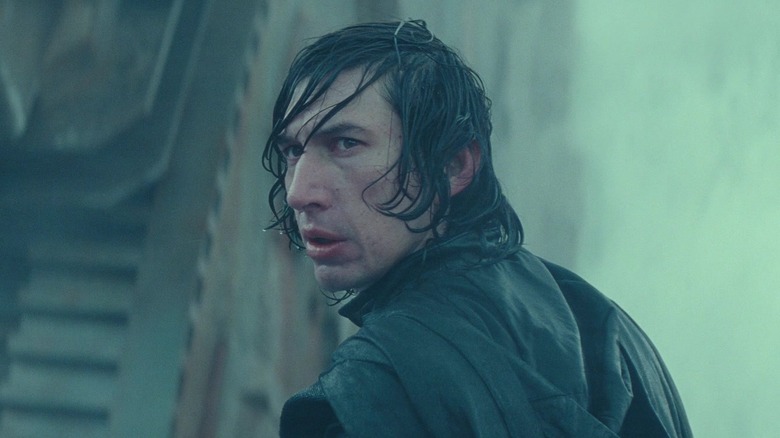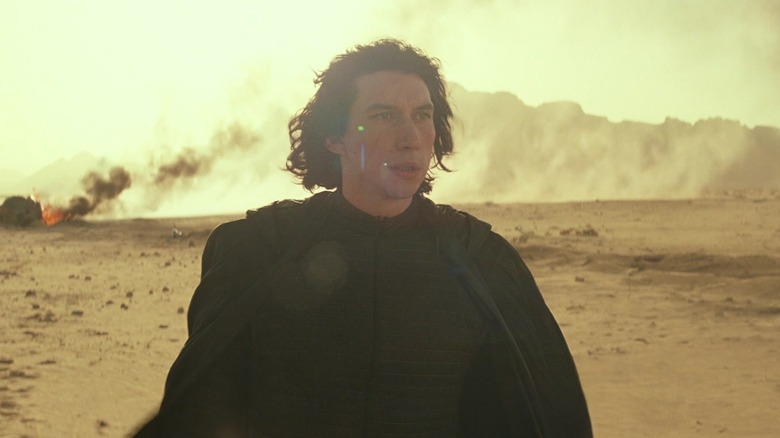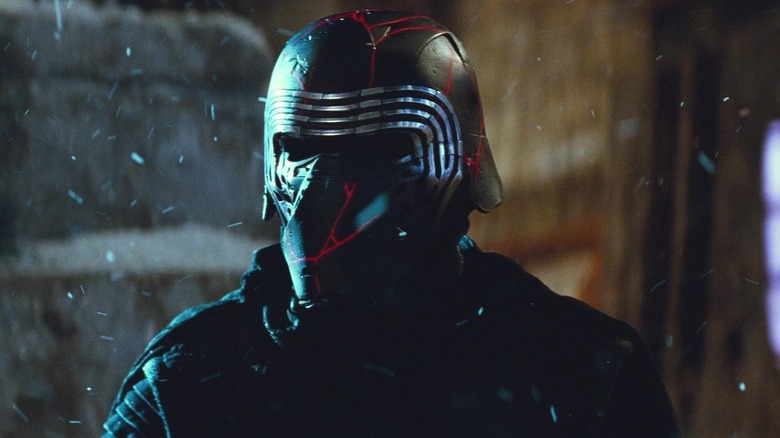Kylo Ren's Original Ending As The 'Opposite Of Vader' Is Dividing Star Wars Fans
"Star Wars: Episode IX — The Rise of Skywalker" sees Kylo Ren (Adam Driver) turn from the dark side just in time to sacrifice himself for Rey Skywalker (Daisy Ridley). This move is not dissimilar from Darth Vader's (James Earl Jones, Hayden Christensen) in "Star Wars: Episode VI — Return of the Jedi." But in a 2023 interview on "The Rich Eisen Show," Driver said he signed up to play a starkly different character, as imagined by "The Force Awakens" director J.J. Abrams.
"His idea was almost the opposite journey of Vader," the actor explained. "He wanted to start at the opposite where [Kylo Ren] was the most confused and vulnerable, and by the end of the three movies would be the most committed to the dark side."
The "Star Wars" online community is not known for agreeing on many things, and its response to Driver's revelation is no different. While the simplest reactions boil down to a single sentence of either approval or dismissal, some fans have taken the time to fully state their case. On X (formerly Twitter), @StrawHatJedi stated that a pure evil Kylo Ren would have undermined the core theme of George Lucas' work, which he considers to be of redemptive hope.
"Given that Ben [Solo] was the only heir to the Skywalkers, this would have gutted the thematic arc of the saga as a whole. ['Star Wars' is] essentially the rise, fall, and redemption of Anakin Skywalker," they wrote. "A hopeful story of forgiveness and redemption would have been turned far more bleak ... Ben [Solo's] story arc is part of a bigger story — and because of his familial connection to the protagonists of the first six films, the way that arc concludes effectively decides the thematic structure of the entire saga."
Is evil Kylo Ren a stronger character?
Adam Driver provided a politically ambivalent response to Rich Eisen's questions on the latter's show. But it is clear that Driver, at least initially, found the idea of playing Darth Vader's narrative opposite compelling.
Certain fans tend to agree. Some, like @hold_vintage, believe that Kylo Ren was intended to portray the mindset of someone susceptible to political indoctrination. They said, "They completely gutted the point of the character which was set up as fascism is a choice made by people who crave power and control not because they are victims of the Dark Side." While no one affiliated with the artistic team for the third "Star Wars" trilogy has officially stated that their work portrays the dangers of fascism, George Lucas openly intended for his space opera to caution against violent political decisions, i.e. the Vietnam War.
Others, like @BeaversGod, believe that an evil Kylo Ren would have better aligned with the narrative as provided at face value. They opined, "Actually ... that might have made more sense based on the prophecy. Maybe 'returning balance to the force' required the rebirth of the Sith in a form more traditional than what Palpatine embodied? Seems so much more interesting than what we ended up with." The prophecy in question states, "A chosen one shall come, born of no father, and through him will ultimate balance in the Force be restored." The origin of the prophecy itself is one of the questions that "Star Wars" movies never quite answer, but this interpretation of it requires "born of no father" to imply that Kylo Ren was born of Luke Skywalker's (Mark Hamill) mistakes, rather than any direct reference to genetic lineage.
Could evil Kylo Ren have saved Star Wars: Episode IX from mediocrity?
Critically speaking, "Star Wars: Episode IX — The Rise of Skywalker" failed to impress. Roger Ebert's site framed it best by comparing the production to how Kylo Ren rebuilt his mask — a complete item with obvious cracks. But where critics found a middling narrative, audiences found a source of entertainment. If Kylo Ren's canon character arc diminished the experience, it did not do so in such a way as to tank the film's broad appeal.
Nonetheless, "The Rise of Skywalker" underperformed at the box office, at least in comparison to "Star Wars" Episodes VII and VIII. While the third installment still earned over $1 billion, the global opening numbers are 17% lower than "The Last Jedi" and 30% lower than "The Force Awakens," which means that fewer and fewer audience members were willing to purchase a ticket for each consecutive entry in the sequel trilogy.
Simply scrolling through the social media responses regarding Adam Driver and Rich Eisen's conversation suggests that more fans, or at least more of the vocal ones, would have rather seen the scrapped version of Kylo Ren. Would that single change have been enough to save "The Rise of Skywalker" from its mediocre response? Maybe not, but hearing so many fans echo a similar desire provides a bit of a framework for what the next "Star Wars" movie — like Taika Waititi's, if it ever happens – might need if it wants to survive.


